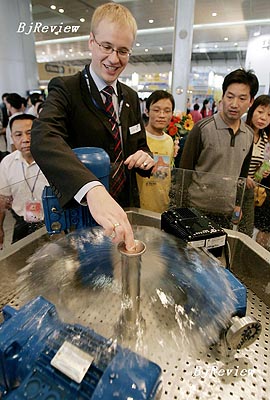|

"I can write more than 200 Chinese characters, I love Beijing roast duck and I like Peking opera," said the 38-year-old Christoph Link, who has been living in China for four years. Link, the owner of Leipzig Trading Co. Ltd., now considers himself an old China hand.
Eight years ago, Link was drawn to the Far East due to his fascination for oriental culture. Traveling first to Tokyo, Japan, then Hong Kong, and finally the Chinese mainland, Link decided to start a new life in a newfound home.
"In the end, I decided to stay in Shanghai," he said. "This city combines old Chinese culture with modern openness, and has been developing very fast in recent years."
After choosing Shanghai as a starting place, Link began his own undertaking in China. "It is well-known that the German engineering industry is the best in the world, and fast-developing China needs advanced technologies," he said. Link's company sells machinery made in Germany to Chinese customers, mostly in Jiangsu and Guangdong provinces. The company's 2006 turnover reached 10 million euros.
In the past five years, China's annual economic growth hit 9.5 percent. The export-oriented German economy, possessing world advanced engineering industry, obviously has benefited greatly from China's economic development. McKinsey & Company stated that the strong integration of product research and development with production and industry restructuring makes the German engineering industry more competitive in the Chinese market.
Currently, there are over 2,600 small and medium-sized German companies in China like Link's company. Germany is now China's biggest trading partner in Europe, and China is Germany's biggest trading partner in Asia. Statistics from China's Ministry of Commerce show that from January to July this year, Sino-German trade volume amounted to $49.97 billion, growing 19.1 percent year on year. China exported $25.49 billion worth of goods to Germany, up 17.9 percent, and imported $24.48 billion worth of goods from the latter, up 20.4 percent.
Christian Sommer, from the German Center for Industry and Trade in Shanghai, a company which helps Germans to set up enterprises in China, believes that coming to China is not only for reducing production costs. More medium-sized German companies now target China as a potential market. A survey from European Union Chamber of Commerce in China found that 41 percent of European companies want to enter the Chinese market because of its huge growth potential. Only 10 percent considered cost-cutting a major benefit.
Link also plans to expand his business in China. "The production cost in China is no less than that in Germany," he said. "But many Chinese companies avoid doing business with foreign companies which don't have an office or factory in China. If we didn't have a factory in China, we would have missed many orders."
Although the prosperous Chinese economy has made Link's business profitable, he believes the market will improve even further. "The Chinese market is not transparent enough," he said. "Even though German products are good in general, they cannot fully participate in the market competition." Link complained that many of the industries are supported and subsidized by the Chinese Government, and sometimes they forced German companies to transfer technologies.
Anton F. Borner, President of Waren-Verein der Hamburger Börse e.V., said the association is striving to encourage more German companies to invest in China but is worried about the intellectual property rights (IPR) protection problem in China.
"We have expressed our willingness to cooperate with our Chinese counterparts, and also shown our concern about the IPR protection to the Chinese Government," said Borner, adding that 90 percent of German companies are small and medium-sized. "The reason why they can exist for such a long time is their own magic production methods. If those technologies are stolen, it would be cataclysmic for these small companies."
Given all the obstacles, Link still believes China is currently the best market in which to invest. He said the Chinese Government is strengthening protection of IPR and the Chinese awareness of IPR protection is also rising.
"The Chinese economic development is so fast that no other country can compare," said Link. "More small and medium-sized companies will grow into large businesses in China. I hope my company is one of them." | 